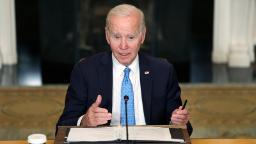[ad_1]

CNN
—
President Joe Biden is “disappointed” the Saudi-led OPEC+ oil cartel agreed to cut output by 2 million barrels per day, the White House said Wednesday, as the threat of rising gas prices looms weeks ahead of critical midterm elections.
The decision by the grouping of major oil producers rebuffed heavy lobbying from US administration officials and prompted Biden to say he was concerned about the move. It reversed a small increase in output OPEC+ announced shortly after Biden visited Saudi Arabia for a conference in July.
Still, the White House insisted that visit was not a “waste of time,” even as it sharply criticized the decision to cut production.
“The President is disappointed by the shortsighted decision by OPEC+ to cut production quotas while the global economy is dealing with the continued negative impact of Putin’s invasion of Ukraine,” said two of Biden’s top aides, national security adviser Jake Sullivan and National Economic Council Director Brian Deese, in a statement.
“At a time when maintaining a global supply of energy is of paramount importance, this decision will have the most negative impact on lower- and middle-income countries that are already reeling from elevated energy prices,” the two advisers wrote.
The administration will “consult with Congress on additional tools and authorities to reduce OPEC’s control over energy prices,” the statement read, without specifying which actions are under consideration dampen the oil cartel’s sway.
Slashing oil production just ahead of November’s midterm elections poses a potential political problem for the President, who has touted this summer’s decreasing gas prices as he works to promote his agenda. The average gas price has been rising nationally again in recent days, according to AAA.
Earlier this year, Biden announced a major release of barrels from the Strategic Petroleum Reserve in an effort to alleviate pump prices. On Tuesday, the White House said it was not considering additional releases beyond the 180 million previously announced.
But after OPEC+ announced its decision on Wednesday, the White House said Biden would “continue to direct SPR releases as necessary,” apparently cracking open the door again to potential releases.
Departing the White House on Wednesday, Biden said he was concerned about the possibility of a significant cut to production.
“I need to see what the detail is. I am concerned, it is unnecessary,” he said in response to a question about the OPEC+ decision as he departed the White House for Florida, where he was set to tour storm damage.
The international cartel of oil producers held a critical meeting Wednesday, where energy ministers decided to slash production by 2 million barrels per day, the biggest cut since the start of the pandemic.
For the past several days, Biden’s senior-most energy, economic and foreign policy officials had been lobbying their foreign counterparts in Middle Eastern allied countries including Kuwait, Saudi Arabia and the United Arab Emirates to vote against cutting oil production.
When he visited Saudi Arabia in July, Biden sought to make clear it wasn’t solely to ask the oil-rich kingdom to increase its oil output. After decrying the regime’s human rights record as a candidate, Biden fist-bumped the powerful Crown Prince Mohammed bin Salman, who US intelligence has said masterminded the murder of Saudi journalist and US resident Jamal Khashoggi.
Speaking on Fox News shortly after the decision was announced, National Security Council communications coordinator John Kirby said the oil cartel was “adjusting back their numbers down a little bit” after making a small increase after Biden’s visit.
“OPEC+ has been saying and telling the word they’re actually producing 3.5 million more barrels than they actually are. So in some ways this announced decrease really gets them back into more align with actual production,” Kirby said, noting there hadn’t yet been dramatic shifts in the price of oil.
“We have to see how it plays out over the long term,” he said.
Kirby said Biden’s visit to Jeddah, Saudi Arabia, for a regional conference “was not about oil.”
“It was about larger national strategic and national interest goals throughout the region to try to foster more integrated cooperative region,” he said.
Source link



